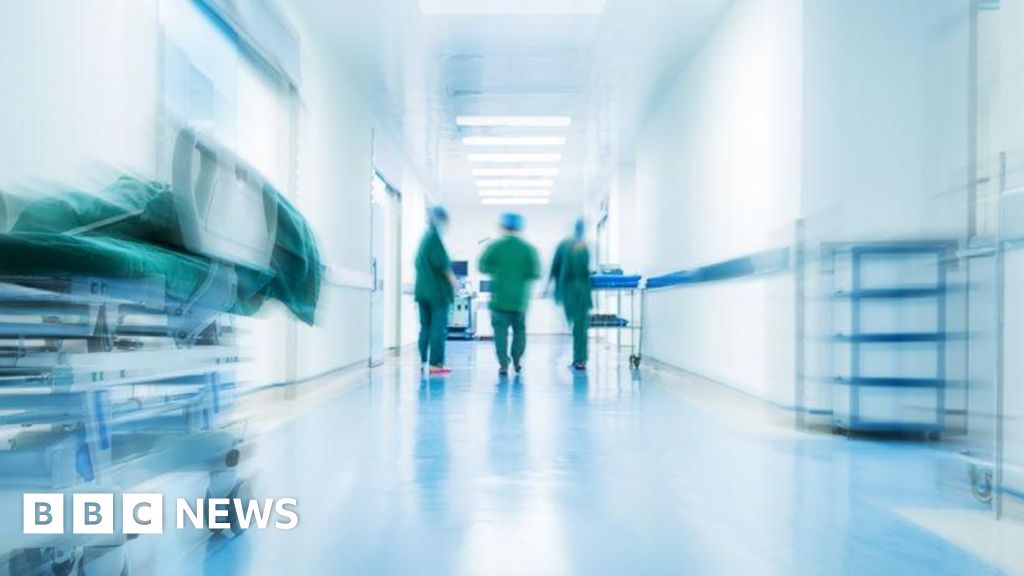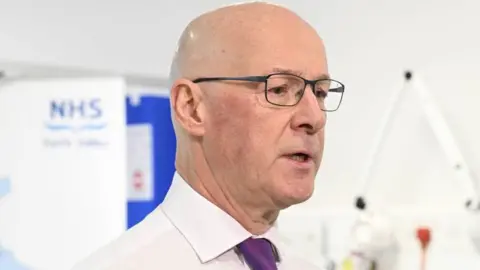
 Audit Scotland
Audit Scotland“Difficult decisions” may need to be made about whether some services can continue to be provided by the NHS in Scotland, a spending watchdog has warned.
A review by Audit Scotland has said fundamental change in how NHS services are provided is “urgently needed” as without change “the NHS is unlikely to be able to meet growing demand”.
The annual report into the health sector found that – despite increased spending and staffing in the NHS – Scotland is seeing fewer patients than before the Covid-19 pandemic.
First Minister John Swinney said progress to improve the performance of Scotland’s health service is being made despite “significant increases in demand”.
The report highlighted that Scottish government commitments to reduce waiting lists and times have been missed and that delayed discharge figures are at their highest on record.
It added that NHS initiatives to improve productivity and patient outcomes have yet to have an impact and lack clear progress reporting.
Stephen Boyle, auditor general for Scotland, said the government needs to “clearly set out” how it will deliver reform.
He said: “To safeguard the NHS, a fundamental change in how services are provided remains urgent.
“Difficult decisions are needed about making services more efficient or, potentially, withdrawing those services with more limited clinical value to allow funding to be re-directed.
“Taking those steps will require greater leadership from Scottish government and NHS leaders than we’ve seen to date.”
 PA Media
PA MediaSpeaking during a visit to Forth Valley hospital on Monday, the first minister said “progress” is being made.
He said: “The government has a very clear plan about concentrating on reducing delayed discharge, tackling the waiting times issues that we face and making sure we have investments in people and infrastructure that will secure the future of the National Health Service.
“That’s the foundation of the plans that the government is bringing forward to deliver progress in the National Health Service and to meet the needs of people in Scotland.”
Audit Scotland said the government “need to focus more on longer-term reform, including difficult decisions about what the NHS should potentially stop doing”.
These “difficult choices” will need to consider “what level and types of services can be provided in future”.
Health remains the single biggest area of government spending in Scotland, with around 40% of the Scottish budget being spent on it.
In 2023/24, £19.1bn was allocated to health – a 2.5% real terms increase. Most of the increase was used to cover pay commitments and inflation.
Colin Poolman, Scotland director for the Royal College of Nursing (RCN), said it was “yet another damning report from Audit Scotland – the second in the space of 10 months – about the Scottish government’s stewardship of the NHS”.
“Without a sustainable, long-term solution to what is now a chronic shortage of nursing staff, the Scottish government will struggle to achieve the reform required,” he added.
Health service ‘broken’
Scottish Conservative health spokesperson Dr Sandesh Gulhane said the report was a “damning indictment of the SNP’s appalling mismanagement” of the NHS.
He said : “Successive SNP health secretaries have been asleep at the wheel as the health service has ended up in permanent crisis on their watch.
“Their dire workforce planning and complete lack of vision means that delayed discharge has reached record levels, hundreds of thousands of Scots are on NHS waiting lists and cancer waiting times have not been met for over a decade.”
Labour health spokesperson Jackie Baillie said: “John Swinney likes to talk up his NHS record but this damning report shows the scale of SNP incompetence on his watch.
“Spending on agency staff is up 45% on five years ago, yet delayed discharge is at a record high and the NHS is missing three-quarters of waiting list targets – after 17 years of the SNP, our health service is broken.”
She added: “The report shows clearly the price hard-working NHS staff and patients are paying for the lack of leadership from the SNP.”
Leader of the Scottish Liberal Democrats, Alex Cole-Hamilton, said the NHS “is on its knees” due to SNP mismanagement.
“Hundreds of thousands of Scots are trapped on an NHS waiting list, while record numbers are stuck in hospital because they can’t get the care they need at home or in the community.
“With staff overwhelmed and the health and social care system going backwards on so many measures, the SNP Government must now admit that its three-year old NHS Recovery Plan has flopped,” he said.
Health Secretary Neil Gray agreed that “reform is essential” for the NHS, and said ministers know people are waiting too long for treamment.
“Significant activity is under way through our £30m investment to target pandemic backlogs. This will see around 12,000 additional new outpatient appointments, around 12,000 additional inpatient/day-case procedures and over 40,000 diagnostic procedures delivered.
“This year we are providing more than £19.5bn for health and social care and under this government funding for the NHS has increased in real terms by 30%,” he said.

Right across the UK the health service is under more pressure than ever before.
Here in Scotland, the auditor general says the government must be clear with people about what the NHS can and cannot afford.
Some tough decisions have already been made.
At the start of this year, spending on new NHS buildings was halted – that has implications for waiting lists because work on national treatment centres has stalled.
Cuts to social care and community health budgets are having a knock on effect in hospitals with record numbers of patients unable to get home when they are ready and emergency departments feeling the pressure as more patients arrive.
Recruitment and retention is being addressed with significant pay rises this year. But staff costs already amount to 60% of annual health spending, meaning less money to spend elsewhere.
The auditor general says more difficult decisions must come if the NHS is to survive. Making them is never going to be easy, or popular, particularly for ministers who will have one eye on the next election.





